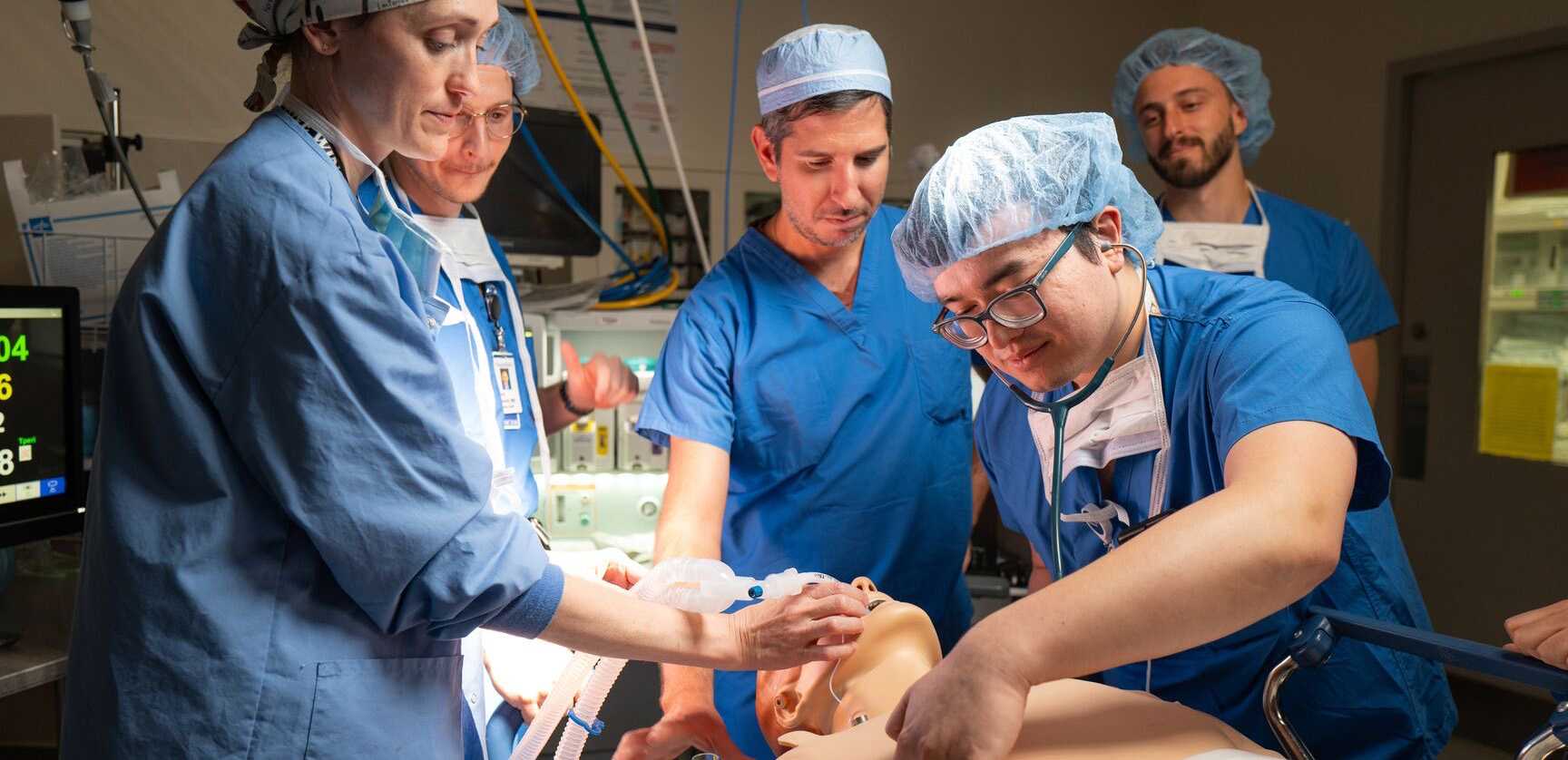HIGHLIGHTS
Anesthesiology Education Division Holds New Simulation Workshops to Augment Residents’ Training
The Department of Anesthesiology’s Graduate Medical Education division held two comprehensive simulation workshops this spring for residents to practice their perioperative skills and prepare for upcoming exams. The “Sim Saturday” workshops were co-organized by Director of the Anesthesiology Residency Curriculum Dr. Angela Vick and Thoracic Anesthesia Division Director Dr. Jay Berger, with support from the entire Executive Simulation Implementation Committee – Residency Program Director Dr. Erik Romanelli, Assistant Residency Program Director Dr. Giselle Jaconia, Vice Chair of Education Dr. Sujatha Ramachandran, and Director of Quality Assurance Dr. Terry-Ann Chambers.
The simulation sessions were the result of a year-long planning process and were designed to expand residents’ hands-on learning in a risk-free environment. The workshops were held at the Montefiore Einstein Center for Innovation and Simulation (MECIS), where members of the MECIS staff are trained in conducting real-life scenarios using advanced simulation manikins. About 15 second- and third-year residents participated for each Sim Saturday, guided by a dozen faculty members who were enthusiastic about the new teaching opportunity.
“I am so very grateful to the amazing educators that we have in this department,” Dr. Vick said. “I think education and learning should be fun, and that was very much reflected in our faculty’s dedication, enthusiasm, and willingness to give up their personal time to come and educate the residents during these Saturday sessions.”
Required on an annual basis by the Accreditation Council for Graduate Medical Education (ACGME), simulation sessions in previous years were conducted twice a month with about four residents at a time practicing various scenarios on a SimMan manikin. But this spring’s Sim Saturday workshops signified the first time a large group of residents had the opportunity to collaborate on simulations in addition to having additional exam preparation and point of care ultrasound training all within one session.
In preparation for the Sim Saturday curriculum development, Dr. Jaconia attended a five-day Healthcare Simulation Essentials course at the Center for Medical Simulation in Boston. Affiliated with Harvard University, the course provided Dr. Jaconia with intensive training in how to create constructive simulations for trainees with a focus on developing a safe learning environment. Dr. Jaconia managed the Sim Saturdays’ Pre-Simulation Safety Briefing, Debriefing, and Rubric/Evaluation Development – skills that she said were essential in learning from the Center for Medical Simulation.
“The idea of psychological safety and an environment of support in simulation is so important,” Dr. Jaconia said. “As faculty, we approach it believing that everybody is capable, intelligent, and wants to do their best. The goal of the simulation is to identify opportunities to learn, not for it to be punitive or create shaming in any way. It’s an opportunity to grow from the activity.”
The faculty sought to make the simulation content as realistic as possible, with specific faculty role playing as other perioperative staff or family members. Dr. Romanelli said this enhanced simulation curriculum is essential for residents because although they are exposed to a wide variety of cases throughout their training, there are certain high acuity events they may not witness in their four years as a resident.
“The goal is to support our residents in becoming perioperative consultants with premium communication skills,” Dr. Romanelli said. “We know simulation training is going to lead to better intraoperative management and interprofessional collaboration during crises when they do happen.”
The Sim Saturday workshops included practice for the Objective Structural Clinical Examination (OSCE), which is part of the Applied Exam to become certified by the American Board of Anesthesiology. The OSCE tests – which are taken a year after completing residency – focus on communication including receiving informed consent from the patient, having a challenging discussion with a healthcare colleague, and disclosing a medical error to a patient.
Dr. Ramachandran emphasized that having these formal practice sessions for the OSCE exams are beneficial for the residents as they continue to develop these skills during the remainder of their residency.
"The OSCE training actually helps residents understand the different elements that make up each skill, and they’re consciously practicing it afterward,” Dr. Ramachandran explained. “When they go through the OSCE of informed consent, for example, they have a better understanding of how they need to talk to patients.”
CA2 Resident Dr. Merlyn George said participating in the Sim Saturday workshop was especially helpful for learning more about scenarios that can be seen on the OSCE, as well as practicing clinical skills, such as point-of-care ultrasound (POCUS).
“It was an incredibly educational experience,” Dr. George said. “The attendings were great actors and made each scenario feel more real. We can’t see every type of clinical scenario during our training, so the fact that we were able to practice reacting to these situations in a real-time simulation was invaluable.”
Dr. Berger, who previously served as the Simulation Director for the Department of Anesthesiology, works closely with the MECIS staff in his current role as Director of the Integration Course at Albert Einstein College of Medicine. He said the MECIS team was an integral part of executing the simulations, which are an integral part of the residency curriculum.
“The reason simulation training is very important is it allows them a safe space to explore their knowledge base and critically think through a scenario without risking harm to a live patient,” Dr. Berger explained. “It allows them to make mistakes and learn from those mistakes so when they have a similar experience in the real world, they’re able to recall what they learned during simulation and react quickly. That’s what makes simulation so valuable.”
Including POCUS training in the Sim Saturday was a part of the Residency Program’s updated curriculum area for POCUS, which Residency Program leadership has strengthened within the last year. With standardized patient models, residents practiced ultrasound technique, and finding and identifying structures on the ultrasound with a specific focus on transesophageal and transthoracic structures. With their expertise in POCUS, Attending Anesthesiologists Drs. Sina Erfani and Emily Stoll led these training stations, which included a gastric exam using POCUS and a transesophageal echocardiogram (TEE).
Dr. Terry-Ann Chambers, who previously served as the Simulation Director for the Department of Anesthesiology before beginning her current role as Director of Quality Assurance, said conducting comprehensive simulations for team members at all levels contributes to continuous quality improvement. Last year, Dr. Chambers organized an interdisciplinary simulation session with the Department of Gastroenterology which included all members of the patient care team – nurses, anesthesia providers, and gastroenterologists – to effectively simulate situations that may arise in the Endoscopic Suite. She looks forward to continuing these multidisciplinary simulations with both Gastroenterology as well as other departments, specifically for procedures conducted in the non-operating room setting.
"Simulation is an important part of improving quality, so the plan is to keep doing these multidisciplinary simulations to improve how we work together in off-site areas and building from there,” Dr. Chambers said.
Dr. Vick added that she is appreciative of both Department Chair Dr. Matthias Eikermann’s and Unified Administrator Jason Hallick’s support of the Sim Saturday initiative.
Patient referrals
At Montefiore Einstein Anesthesiology, we know providing patients with the best possible care includes teamwork and trust. We work closely with our valued referring physicians to ensure open communication and reliable expertise.

